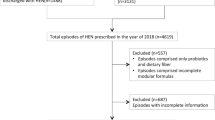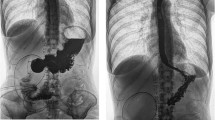Abstract
Introduction
Short bowel syndrome (SBS) is a leading cause of intestinal failure (IF). Home parenteral nutrition (HPN) remains the standard treatment, with small intestinal transplantation reserved for cases with severe complications to HPN. There have recently been significant developments in growth factor therapy. We aimed to develop a greater contemporary understanding of our SBS-IF subset.
Method
We performed a retrospective observational study of a prospectively maintained HPN audit database in October 2017. Intestinal anatomical details and parenteral requirements were recorded. Each case was assessed for eligibility for growth factor therapy using recently published trials.
Results
Of 273 patients receiving HPN, 152 (55.7%) had type three IF as a result of SBS (SBS-IF), with a mean duration of HPN of 61 months (range 4–416). Mean length of small intestine was 98 cm. Furthermore, 114 (41.8%) patients had an end jejunostomy (SBS-J), 18 (6.6%) had an end ileostomy, and 7.3% of patients had all or part of the colon-in-continuity. Crohn’s disease was the most common underlying pathology. Univariate analysis for the whole HPN cohort demonstrated SBS-IF and a longer duration of HPN to be associated with higher PN energy requirements, p ≤ 0.0001. Of all, 73 (48%) patients with SBS-IF were deemed suitable for GLP-2 analogue therapy, with co-morbidity being the most frequent cause of non-suitability (29.1%).
Conclusion
We describe a large U.K. HPN cohort using ESPEN pathophysiological and clinical severity classification. The majority of patients with SBS-IF had a jejunostomy and relatively few had colon-in-continuity. Co-morbidity is the most common contra-indication to GLP-2 analogue therapy.
Clinical relevancy
GLP-2 analogues are emerging as an important treatment for patients with short bowel syndrome. Our study explores patient suitability in a large HPN cohort managed in a national IF centre. Furthermore, the international variation in the pathophysiology of SBS-IF varies significantly, which can have a bearing on PN requirements and outcomes when GLP-2 analogues are used.
This is a preview of subscription content, access via your institution
Access options
Subscribe to this journal
Receive 12 print issues and online access
$259.00 per year
only $21.58 per issue
Buy this article
- Purchase on Springer Link
- Instant access to full article PDF
Prices may be subject to local taxes which are calculated during checkout
Similar content being viewed by others
References
Pironi L, Arends J, Bozzetti F, Cuerda C, Gillanders L, Jeppesen PB. et al.ESPEN guidelines on chronic intestinal failure in adults. Clin Nutr. 2016;35:247–307. https://doi.org/10.1016/j.clnu.2016.01.020.
Pironi L, Konrad D, Brandt C, Joly F, Wanten G, Agostini F et al. Clinical classification of adult patients withchronic intestinal failure due to benign disease: an international multicenter cross-sectional survey. Clin Nutr. 2017;728-38. https://doi.org/10.1016/j.clnu.2017.04.013.
O’Keefe S, Buchman A, Fishbein T, Jeejeebhoy K, Jeppesen P, Shaffer J. Short bowel syndrome and intestinal failure: consensus definitions and overview. Clin Gastroenterol Hepatol. 2006;4:6–10.
Staun M, Pironi L, Bozzetti F, Baxter J, Forbes A, Joly F, et al. ESPEN guidelines on parenteral nutrition: home parenteral nutrition (HPN) in adult patients. Clin Nutr. 2009;28:467–79.
American Gastroenterological Association (AGA). American Gastroenterological Association medical positionstatement: short bowel syndrome and intestinal transplantation. Gastroenterology. 2003;124:1105–10.
Amiot A, Messing B, Corcos O, Panis Y, Joly F. Determinants of home parenteral nutrition dependence and survival of 268 patients with non-malignant short bowel syndrome. Clin Nutr. 2013;32:368–74.
Dibb M, Soop M, Teubner A, Shaffer J, Abraham A, Carlson G, et al. Survival and nutritional dependence on home parenteral nutrition: three decades of experience from a single referral centre. Clin Nutr. 2016;16:S0261–5614.
Wu G, Jiang Y, Zhu X.Jin D, Prevalence and risk factors for complications in adult patients with short bowel syndrome receiving long-term home parenteral nutrition. 2017;26:591–7.
Iyer K. Surgical management of short bowel syndrome. JPEN J Parenter Enter Nutr. 2014;31:53S–59S.
Jeppesen P. New approaches to the treatments of short bowel syndrome-associated intestinal failure. Curr Opin Gastroenterol. 2014;30:182–8.
Billiauws L, Bataille J, Boehm V, Corcos O, Joly F. Teduglutide for treatment of adult patients with short bowel syndrome. Expert Opin Biol Ther. 2017;17:623–32.
Tappenden K, Edelman J, Joelsson B. Teduglutide enhances structural adaptation of the small intestinal mucosa in patients with short bowel syndrome. J Clin Gastroenterol. 2013;47:602–7.
Vipperla K, O’Keefe S. Study of teduglutide effectiveness in parenteral nutrition-dependent short-bowel syndrome subjects. Expert Rev Gastroenterol Hepatol. 2013;7:683–7.
Naberhuis J, Tappenden K. Teduglutide for safe reduction of parenteral nutrient and/or fluid requirements in adults: a systematic review. J Parenter Enter Nutr. 2016;40:1096–105.
O’Keefe SJD, Jeppesen PB, Gilroy R, Pertkiewicz M, Allard JP, Messing B. Safety and efficacy of teduglutide after 52 weeks of treatment in patients with short bowel intestinal failure. Clin Gastroenterol Hepatol. 2013;11:815–e3.
Kochar B, Long M, Shelton E, Young L, Farraye F, Yajnik V, et al. Safety and efficacy of teduglutide gattex in patients with Crohns disease and need for parenteral support due to short bowel syndrome associated intestinal failure. J Clin Gastroenterol. 2017;51:508–11.
Schwartz LK, O’Keefe SJD, Fujioka K, Gabe SM, Lamprecht G, Pape U-F, et al. Long-term teduglutide for the treatment of patients with intestinal failure associated with short bowel syndrome. Clin Transl Gastroenterol. 2016;7:e142.
Brandt CF, Tribler S, Hvistendahl M, Staun M, Brobech P, Jeppesen PB. A single-center, adult chronic intestinal failure cohort analyzed according to the ESPEN-endorsed recommendations, definitions, and classifications. J Parenter Enter Nutr. 2015;41:566–74.
Uchino M, Ikeuchi H, Bando T, Matsuoka H, Takahashi Y, Takesue Y, et al. Risk factors for short bowel syndrome in patients with Crohn’s disease. Surg Today. 2012;42:447–52.
Hedrick T, Friel C. Colonic Crohn disease. Clin Colon Rectal Surg. 2013;26:84–9.
Iyer KR, Kunecki M, Boullata JI, Fujioka K, Joly F, Gabe S. et al. Independence from parenteral nutrition and intravenous fluid support during treatment with teduglutide among patients with intestinal failure associated with short bowel syndrome. J Parenter Enter Nutr. 2016;41:946–51.
Jeppesen P, Gabe S, Seidner D, Lee H, Olivier C. Factors associated with response to teduglutide in patients with short-bowel syndrome and intestinal failure. Gastroenterology. 2017;22:S0016–5085.
Joly F, Gabe S, Seidner D, Mu F, Xie J, Kelkar S, et al. Predictors of response to teduglutide among patients with parenteral nutrition–dependent short bowel syndrome. Transplantation. 2017;101:pS8.
Lam K, Schwartz L, Batisti J, Iyer KR. Single-center experience with the use of teduglutide in adult patients with short bowel syndrome. JPEN J Parenter Enter Nutr. 2017;42:225–30.
Buchman A, Katz S, Fang J, Bernstein C, Abou-Assi S. Teduglutide, a novel mucosally active analog of glucagon-like peptide-2 (GLP-2) for the treatment of moderate to severe Crohn’s disease. Inflamm Bowel Dis. 2010;16:962–73.
Author information
Authors and Affiliations
Corresponding author
Ethics declarations
Conflict of interest
The authors declare that they have no conflict of interest.
Rights and permissions
About this article
Cite this article
Bond, A., Taylor, M., Abraham, A. et al. Examining the pathophysiology of short bowel syndrome and glucagon-like peptide 2 analogue suitability in chronic intestinal failure: experience from a national intestinal failure unit. Eur J Clin Nutr 73, 751–756 (2019). https://doi.org/10.1038/s41430-018-0278-8
Received:
Revised:
Accepted:
Published:
Issue Date:
DOI: https://doi.org/10.1038/s41430-018-0278-8



